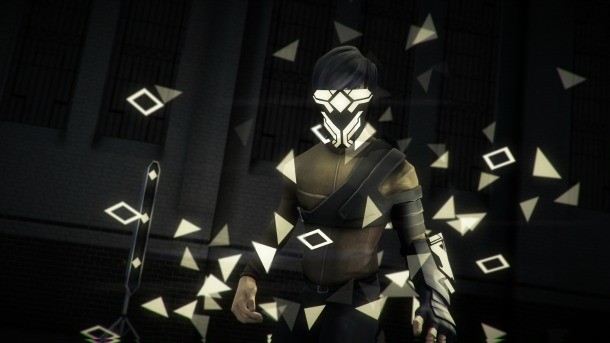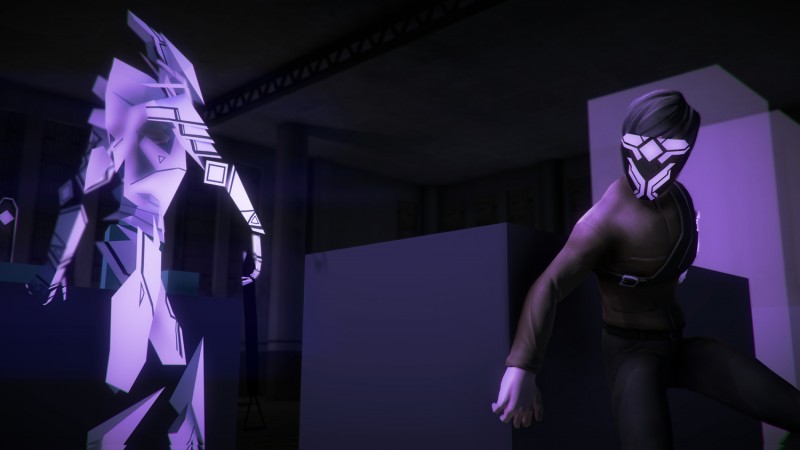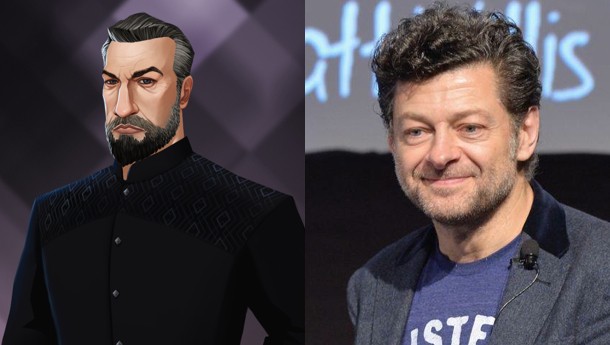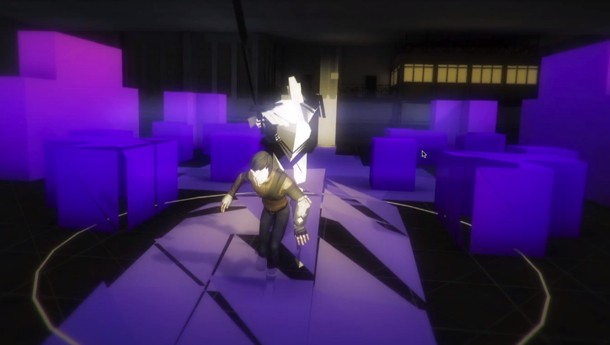Volume Creator Discusses Robin Hood, Class Warfare, & Let's Play Influences

Volume is a game that, blatantly enough, takes a swell of inspiration from Robin Hood legends and the fondly remembered VR gameplay of Metal Gear Solid. Hero Robert Locksley intends to shake down the fortunes of the corrupt one percent, all by instructing viewers via a live stream of his simulated heists in the titular A.I. program, the Volume. The Volume allows Locksley to build simulated environments identical to the residences and workplaces of those he’s about to rob from, with the assistance of the Volume’s A.I. “Alan,” voiced by Danny Wallace. Locksley’s viewers are then instructed to replicate his pacifist infiltrations.
What’s most interesting isn’t the jolly tale of the quintessential thief, but the shades of grey developer Mike Bithell has added to the tale, calling into question the morality of a modern day Robin Hood. In the age of online video streaming and massive cult followings, many of which are thanks to the rise of YouTube Let’s Play stars, how much responsibility does an internet celebrity carry for his audience and their actions? When they begin to replicate their idol – turning their hero’s simulations into actions, often at the risk of something tangible – is it safe to say who the good guy is anymore?
Spoiler Warning
These are questions Bithell, the mind behind indie darling Thomas Was Alone, has chosen to ask players to decide for themselves. There is no manifesto, he says.
“It was a very practical problem I was trying to solve,” Bithell says. “I knew I wanted to make a stealth game and a game that wasn’t about killing. That led me down the thieving line and I started to research how you even make a likable thief, and so you grow into Robin Hood. What really excited me about Robin Hood and specifically the idea of adapting it is that it’s a story that comes around every generation.”
There’s a reason Robin Hood sticks with audiences as a timeless tale. His exploits as a hero that robs from the rich and gives to the poor have long stood as a natural commentary on the greed and power of the ruling classes.
“The point where I got excited was this idea of the revolution needing a second revolution,” Bithell says. “When you look at the history books, it’s very rare that a revolution takes power away from the existing people and then that’s just the end of it.”

Bithell began writing Volume’s script around the time of the Arab Spring, a series of pro-democracy rebellions across the Middle East that began in 2010 and resulted in the president of Egypt’s resignation among countless other regime shifts. In Bithell’s home turf of London, talks of the region becoming an independent city state and the 2014 Scottish independence referendum continue to drastically shape UK politics. As Bithell continued writing, events that began to shape both world and western politics grew to closely resemble his own outline for the game’s narrative.
“I guess what happens a lot when you’re writing sci-fi is that as time goes on – and the game was in production for two-and-a-half years – it seemed more and more prescient,” Bithell says. “I saw more and more news stories that echoed things like this.”
Enter Volume’s Guy Gisborne, played by the renowned actor Andy Serkis. Serkis is known for his motion capture roles in The Lord of the Rings, Dawn of the Planet of the Apes, and games like Heavenly Sword and Enslaved. In the original Robin Hood tales, Gisborne was a constant foil for the titular hero and a romantic rival for Maid Marian’s hand. In Volume, Bithell has reimagined Gisborne as the CEO of a massive company that now leads the nation as a corporatocracy. Rather than the violent coups that swept less modernized regions of the world, Gisborne’s own ascent proved to be relatively bloodless according to in-game documents, capitalizing on the mass’ disenfranchisement.
“Wouldn’t that be ridiculous if someone, simply by being really, really rich could run for office in a western culture?” Bithell says, jabbing at the more absurd candidates of recent election cycles. “Gisborne had to be believable, because he’d won. His revolution happened nine years ago, and he had to be a charismatic guy, who could have believably held onto power that long and taken the country.”
It was Serkis’ performance that prompted the inclusion of an additional cutscene midway through the game, one that Bithell says wasn’t originally planned. It’s this momentary break in the action that allowed for the beginning of Gisborne’s “layers of niceness”, as Bithell calls it, to peel away as he confronts Locksley via hologram.

“Some actors like to be pointed at a microphone and told what to say. With Andy, it was more about feeling out that character and what made him tick,” Bithell said. “I decided to approach him after watching Rise of the Planet of the Apes. That raw energy he manages with a word or two, I thought “Wow, if I can capture that energy and put it into a video game, that’s pretty cool.”
It’s this scene where Volume’s main thrust comes into play. Gisborne brings up floating images of every person who has thus far attempted to emulate Locksley’s heists, insinuating that each is now in custody or dead thanks to their own foolishness. Early on in Volume, Locksley makes it absolutely clear to his A.I. companion that weapons are not to factor into his simulations. If he can’t perform as a pacifist, neither should his adoring fans. This, of course, ignores the reality of what anyone far less skilled than Locksley might attempt, including using actual weapons “just in case.”
“I tried to warn you,” Gisborne says, seething with restrained malice. “You act out your clean little actions in the Volume, rebalancing my grand design, but you inspire messy people, Locksley. People who get caught. People who take weapons into my friends’ homes. You fight your safe little war, pretending to rob from the rich and give to the poor. But ultimately, you’re just taking credit for sending innocent people into harm’s way.”
And suddenly, Volume’s tidy Robin Hood metaphor is turned upside down. In the age of online activism, where progress is often counted in the form of likes and retweets, Volume takes the natural next step in the question of how Robin Hood would come across in the age of subscriber counts.

“I’m fascinated by [YouTube] as a phenomenon,” Bithell says. “I’m interested in that element of performance. It was something I identified in the Robin Hood character. He’s a showoff. It’s not always clear if he’s doing it because he wants to save the country or if he likes being seen saving the country. Therefore I thought if this is a slightly narcissistic character then they might well be on YouTube.”
Though Bithell says it’s not his place to comment on the machinations of social movements, he sees the conversations swirling around each one as an opportunity for discussion that’s only been accelerated by the internet and YouTube culture.
Naturally, if your theoretical hero is a champion of the digital masses, it only makes sense to draw in the right personality for such a role. Bithell’s choice to cast UK YouTube star Charlie McDonnell (known for being the first UK video blogger to reach one million subscribers) as Locksley was a conscious one that tied into what made him as a character.
“It’s certainly an exaggerated version of himself,” Bithell says. “With YouTubers, there’s the persona they project versus the reality of what the human is. So it’s kind of based on his persona and an expanded version of that. He’s not a grim, gruff hero. He’s a kid on the internet.”

It remains to be seen what impact an indie game can have on the conversation about Let’s Play audiences and the responsibility that media creators have to those they influence. This is the age of media accessibility that’s allowed PewDiePie, a former hot dog stand worker, to amass incredible wealth and millions of followers. It’s also the age where those same individuals can amass hundreds of thousands of dollars for benevolent causes.
Gamer culture is lucky to see these men and women most prominently, but it only takes one apple to spoil the barrel. In 2013, a Twitch streamer who claimed to be disabled collected $20,000 from fans before being banned after video footage of him walking surfaced. More recently, television host Jimmy Kimmel was the recipient of an endless string of harassment from anonymous commenters after voicing an opinion on Let’s Play culture. It seems that with great subscriber count comes great responsibility.
In practice, Volume appears to be the personification of both Bithell and Locksley’s need to remain fair on the issue of inequality and how to address it. Locksley would rather use a distracting whistle or a diversionary hologram and let his followers enact a return to justice of their own free will. In the real world, Bithell sees fit to leave the questions his narrative raises on the table, ready for players to make of them what they will. In a game called Volume, that seems like a quiet feat.
Bithell says he hopes Volume stands as a game that rewards intelligence, foresight, and wit. Considering how Volume ventures beyond the established boundaries of Robin Hood’s lore and lets players absorb it naturally, it won’t be long before future players feel richer for the experience.

Get the Game Informer Print Edition!
Explore your favorite games in premium print format, delivered to your door.
- 10 issues per year
- Only $4.80 per issue
- Full digital magazine archive access
- Since 1991









